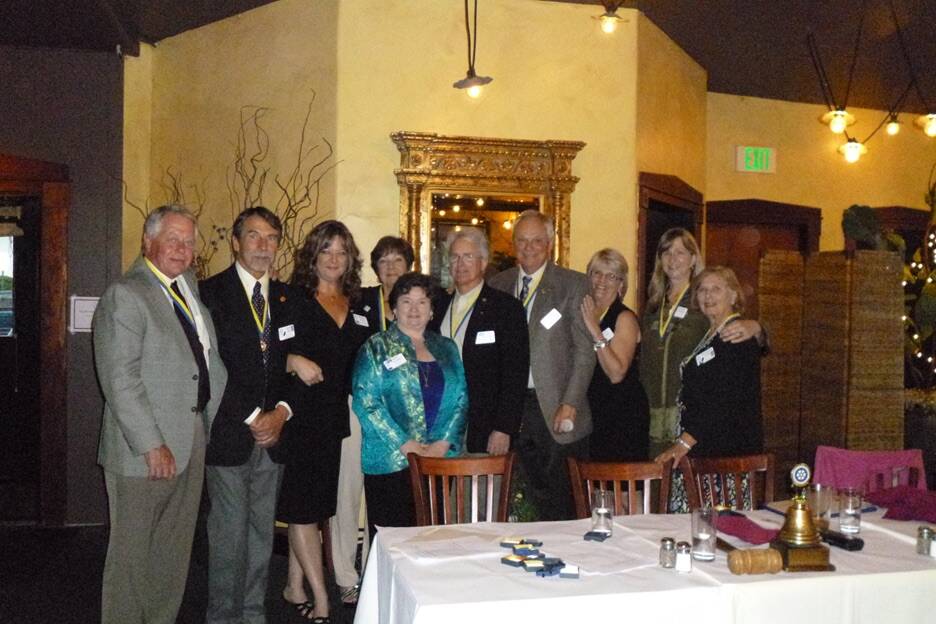The annual Rotary Spelling Bee, school nutrition program 36 Weekends and working to eradicate polio are just a few Rotary Club of the San Juan Islands projects since beginning in 2003. Dec. 10 members gathered at the San Juan Island Grange to celebrate their 20th year.
“Seventy-five percent of our dues goes toward the community,” founding member Barbara Fagan told the crowd. Tom and Maria Small, Rotarians from Alaska, saw a need for the club in their new island home. The first president was Mary Kalbert. Other original San Juan Island members include Chris Spaulding, Bill Weissinger, Diane Giesy, John Allsop, Rusty Pollock, Phil Mayer and Peter Whiting.
While most of their funding stays in the community, the club is strongly active internationally as well. The club joined the International Project Alliance in 2015. According to Mike Griffin, International Chair, IPA have a long-term commitment to assisting indigenous Mayan people in 38 mountain villages of the Copan Ruinas region of western Honduras.IPA is a large collaborative group of Rotary clubs in northwest Washington State and one in British Columbia. Founded in 2014, IPA’s projects cover most areas of international aid, including education, health, food and agriculture, water and sanitation, construction, and economic development. There are four trips planned yearly. This allows members to meet their sponsored students and visit schools to deliver books, uniforms and local work projects.
The club adopted the Rosalita Grade School in 2015 and sponsors three to five students each year. San Juan Rotarians later went on to adopt the entire village. Members have also personally adopted students in several villages around the region, some of whom have continued through high school and on to college.
Rotary of San Juan members have traveled to New Zealand to assist with Habitat for Humanity, funded cancer screenings in Mexico, assisted financially installing water purifiers in 15 schools in India, as well as a deep water well in Zambia that had been damaged in a thunderstorm. Local Rotarians also installed a solar power system, and training of the system, in Hatti, for women to power their sewing machines.
Recently the club was among 24 chapters to receive special recognition from Rotary International for their support of the End Polio Now Countdown, current President Susan Martin announced to the anniversary attendees.
Over the last two decades, Rotary has made a significant impact throughout the islands. There is now a satellite chapter on Orcas Island. This group is a small but mighty force that raised $13,000 last year during the Orcas Island Rotary Pickleball Tournament fundraiser. This amount was doubled over the past year.
The original Rock the Dock became their first major fundraiser. The event was created by Mike Close and lasted at least a decade. The Rotary Car Show is currently their major fundraiser for their local projects, raising funds for the Joyce L. Sobel Family Resouce Center, Family Umbrella Group, Mobile Dental Van as well as for Polio Plus, of Rotary International. The event raised $17,000 last year.
To assist island schools, members have participated in the San Juan Islands Public Schools Foundation annual fundraiser Knowledge Bowl, (winning 1st prize in ‘22), established a bus shelter, participate each year in the Children’s Festival, 4th of July parade and The Great Island Clean up. Literacy has been a major component of their mission. Over the past 13 years, Rotarians have distributed approximately dictionaries to 3rd-5th graders throughout the county, amounting to approximately 4,776 books. They also hold an annual spelling bee and established two free libraries.
Realizing island youth were going through weekends without food, the chapter created 36 Weekends. To reduce food insecurity, the program provides two breakfasts, two lunches, two dinners and snacks for elementary-age students. Project manager Paul Mayer explained that when children are hungry behavioral issues arise. “Superintendant Fred Woods told me that since COVID when we started doing a more expansive food program with 36 Weekends, those behavior problems basically disappeared,” Mayer added. He also gave kudos to the Joyce L. Sobel Family Resource Center with whom Rotary partners to reach the families in need. “They have been great,” Mayer said.
The program costs approximately $32,000 per year or $500 per student, Mayer told the attendees. Rotary recently received a grant to expand the program throughout the summer, which would have a tremendous impact for the island youth. The anniversary dinner auction on Dec. 10 raised $15,000 for the program. With the expansion, 36 Weekends will have a permanent home soon and will need additional volunteers for packing and deliveries.
“You can see the smiles on their faces when you deliver the food,” Mayer said.
To learn more about Rotary, visit https://rotaryfoundationsanjuanislands.org, or visit the IPA website inf0@ipafoundation.org.




